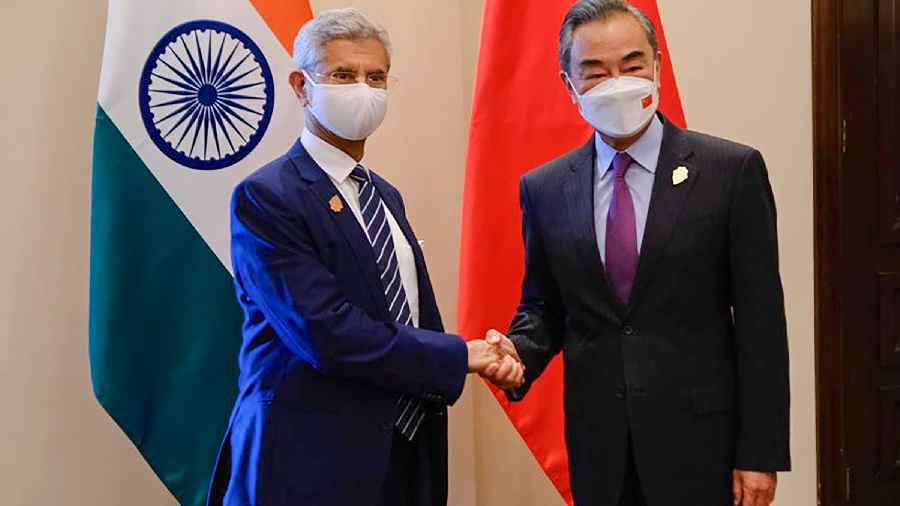The ties between China and India have generally shown a "momentum of recovery" as the two countries have maintained communication and effectively managed their differences, Chinese Foreign Minister Wang Yi told his Indian counterpart S Jaishankar during their meeting in Bali on Thursday.
During the one-hour meeting on the sidelines of a conclave of foreign ministers of the G20 nations, Jaishankar conveyed to Wang the need for an early resolution of all outstanding issues along the Line of Actual Control (LAC) in eastern Ladakh, and asserted that bilateral ties should be based on mutual respect, mutual sensitivity and mutual interest.
Wang said that since March this year, China and India have maintained communication and exchanges, effectively managed differences, and the bilateral relations have generally "shown a momentum of recovery."
China and India, he said, share common interests and similar legitimate claims.
On the bilateral issues, Wang said the two countries should take practical actions to implement the important consensus of the leaders of the two countries that "the two countries are not each other's threats, but cooperation partners and development opportunities."
He also said the two countries should push for the early return of the bilateral relations to the right track and light up the bright future of the relations together.
China and India, Wang said, share common interests and similar legitimate claims, state-run Xinhua news agency reported, quoting a press release on the talks issued by the Chinese Foreign Ministry here.
Apparently referring to independent stand struck by both the countries on the Ukraine issue, Wang said as the world is undergoing profound changes unseen in a century, major countries like China and India will definitely not go with the flow but are destined to uphold strategic determination, achieve their respective development and revitalisation in accordance with the established goals, and make greater contributions to the future of mankind.
Wang said China appreciates India's support for its hosting the BRICS meetings and the High-level Dialogue on Global Development in June, and it will support India's work in 2023 as the next rotating chair of the G20 countries and of the Shanghai Cooperation Organization (SCO).
Noting that both countries, as advocates of multilateralism, share views in areas ranging from safeguarding peace and security, boosting economic recovery, improving global governance, to jointly combating COVID-19, Wang said they should strengthen coordination and cooperation, and join efforts to make international relations more democratic, international order fairer, the developing countries' voices to be heard more and their legitimate interests better maintained.
In New Delhi, the Ministry of External Affairs (MEA) said Jaishankar reaffirmed the importance of "fully abiding" by bilateral agreements and protocols, and the understandings reached between him and Wang in their previous conversations.
"The External Affairs Minister (EAM) called for an early resolution of all the outstanding issues along the LAC in Eastern Ladakh," the MEA said in a statement.
It was the first meeting between the two foreign ministers since Wang visited India on March 24 and 25.
Earlier, Chinese Foreign Ministry spokesman Zhao Lijian while referring to the Indian press release said "what I can say is that the China-India border area is generally stable at the moment".
"The two sides have agreed to follow the important common understandings reached by the two leaders and the agreements signed by both sides, and properly resolve issues related to the Western sector of the China-India boundary in line with the principle of mutual and equal security," he said.
"China and India are each other's important neighbours. The two sides have the will and capability of jointly maintaining peace and tranquility in the China-India border areas," he said.
The border standoff between the Indian and Chinese militaries erupted on May 5, 2020, following a violent clash in the Pangong lake area.
The face-off escalated after the Galwan Valley clashes on June 15, 2020. Both sides gradually enhanced their deployment by rushing in tens of thousands of soldiers as well as heavy weaponry.
As a result of a series of military and diplomatic talks, the two sides completed the disengagement process last year in the north and south banks of the Pangong lake and in the Gogra area.










